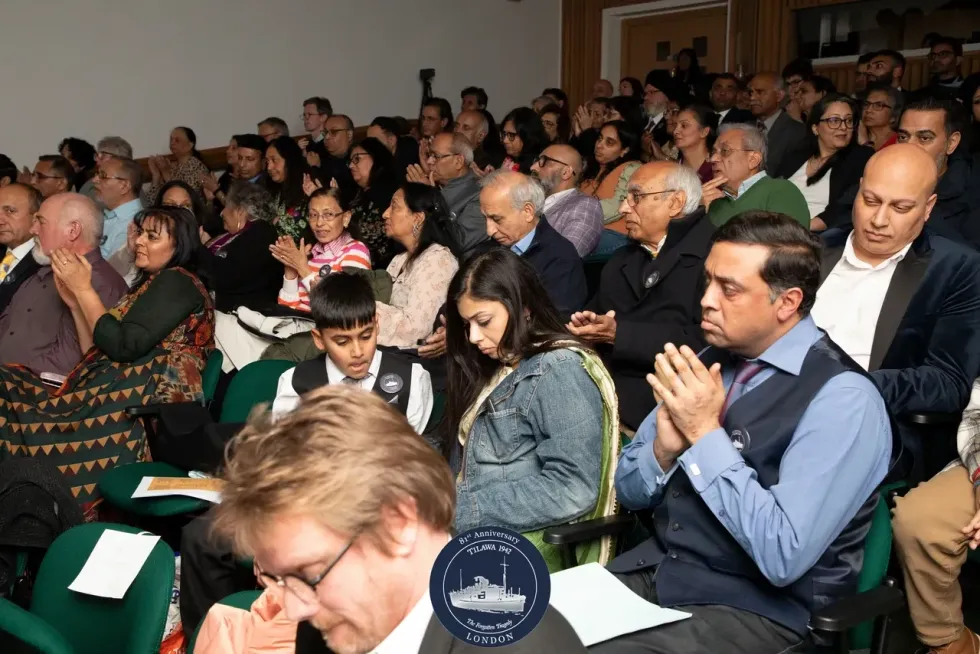Survivors of a sunken ship and their descendants came together for a commemoration at London’s National Maritime Museum in Greenwich last month.
It has been 81 years since the passenger-cargo ship, SS Tilawa, sank after it was torpedoed twice by the Imperial Japanese Navy in the Indian ocean during the Second World War.
Some 140 people from all over the world attended the event on November 23, which marked the first commemoration on British soil to officially acknowledge the tragedy.
Royal Borough of Greenwich mayor Dominic Mbang, former Leicester East MP Keith Vaz, councillors Manju Shahul-Hameed and Lakshan Saldin, Indian artist Navin Kundra and his wife and The Apprentice contestant Jasmine Kundra also attended the event.
The Tilawa set sail for Durban from Mumbai (formerly Bombay) with 222 crew members, 732 passengers - mostly Indians emigrating to Africa - and four gunners on board on November 20, 1942.
The ship, which was also carrying 6,000 tons of cargo, including 60 tons of silver bullion, sank three days later on November 23 when it came under attack by the Japanese submarine I-29, about 930 miles northeast of the Seychelles.
HMS Birmingham and SS Carthage rescued 678 people, however, 280 others perished in the tragedy.
The British India Steam Navigation Company’s ship came to be known as the "Indian Titanic", a reference to the sinking of the passenger liner Titanic in the Atlantic Ocean in 1912.
Tilawa 1942 Heritage Productions founder Emile Solanki organised the commemorative event in London. He and his father Mukesh are descendants of missing passenger Nichhabhai Chibabhai.
Both called for greater research into what they said was a “forgotten tragedy”.

Among those who attended the event were a Goan-origin Londoner, Mervyn Maciel, who lost his parents and three siblings onboard the Tilawa. He was 13 years old when his family were told by a Tilawa cabin boy that his father was afraid to jump into a lifeboat and leave his wife and children behind.
Maciel, now 95, received a letter from Buckingham Palace which said the King hoped the commemoration would bring “comfort to those families affected by this historic event.”
Two survivors - Tejparkash Mangat, 90, from Ohio and Arvindbhai Jani, 84, from south London reunite after 81 years at the commemoration.
Mangat was nine years old when she lost her mother and three brothers in the disaster. Mangat was in a lift boat for two days in the middle of the Indian Ocean, not knowing what had happened to her family.
Her father, Pritam Singh, was holding on to a plank and assisting a six-year-old girl until HMS Birmingham came to the rescue.
Jani was three years old when his mother - Vasantben L Jani - wrapped him in her sari and jumped into a lifeboat, the audience heard.
Solanki said, “Whilst these two survivors may not have personally known each other in 1942, it was emotional to see them together in the same room 81 years later. To think they once stood and sat in the very area of my great-grandfather is mind-boggling.”
London Gujarati Darji Community president Pravin Jivan shared the story of his late father Morar who survived and assisted in the rescue of about 20 people on a raft.
The participants presented “unanswered questions” as to what prompted the Japanese to attack the ship and whether the vessel contributed to the war effort.
Solanki, who set up the educational website tilawa1942.com after years of efforts, joined hands with the Maritime Mumbai Museum Society to organise the first commemoration in 2022 in Mumbai from where the vessel last left for its fateful voyage.
He is looking to collaborate with the SS Tilawa Foundation in South Africa to hold a third commemorative event in Durban.
“Whilst I have a long wish list of efforts I am working through, this 2024 commemoration was a dream to give many families in Africa an opportunity to come together in-person. The list of families in South Africa alone is impressive,” he said.
Ownership of silver bars
The Tilawa is also the subject of an ongoing case in the UK Supreme Court. The shipwreck was initially considered unsalvageable. However, the London-based company Argentum Exploration recovered a cargo of 2,364 bars of silver - said to be worth £37.35 million - from a depth of 2.5 kilometres in the wreck site in 2017.
While the company sought a declaration that it was the owner of the silver, South Africa claimed its ownership as the metal had been destined to be minted into coinage by the country.
According to a Law Society Gazette report, the Supreme Court will decide whether state immunity applies when the cargo was ‘in use or intended use for commercial purposes’.
If its claim of state immunity is granted, South Africa will not have to pay a salvage fee to Argentum.



















